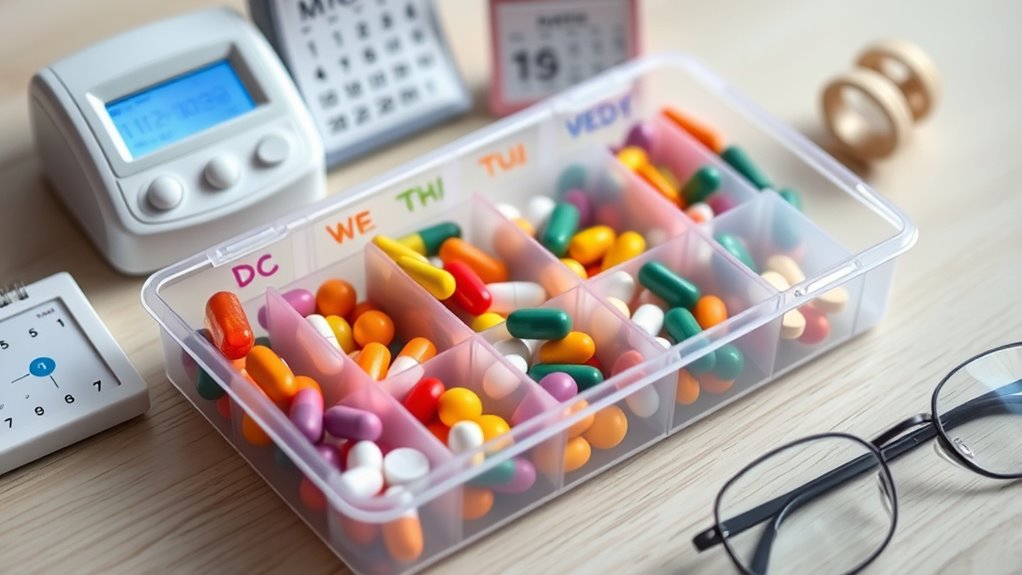To organize and track medications for your elderly loved one, use a clear pill organizer with labeled compartments for days or times of day. Create a simple schedule aligned with their daily routine and add reminders like alarms or apps. Regularly check that pills are not expired and stored safely. Keep communication open with healthcare providers and update the system as needed. Keep exploring ways to make medication management easier and safer for your loved one.
Key Takeaways
- Use labeled pill organizers with compartments for days or times to keep medications organized and visible.
- Develop a medication schedule aligned with daily routines, using visual cues and alarms for timely doses.
- Regularly review medications for expiration, accessibility, and updates, adjusting the schedule as needed.
- Communicate clearly with healthcare providers and other caregivers about medication plans and changes.
- Store medications safely in a cool, dry place out of children’s reach and verify proper storage during checks.

Managing medications for elderly loved ones can feel overwhelming, but staying organized is key to guaranteeing they take the right doses at the right times. One of the most effective tools you can use is pill organizers, which help keep medications sorted and visible. These small containers typically have compartments labeled by days of the week or times of day, making it easier to set up a clear medication schedule. With a well-organized pill organizer, you reduce the risk of missed doses or accidental overdoses. You can prepare the week’s medications in advance, which not only streamlines daily routines but also minimizes confusion, especially if your loved one has multiple prescriptions.
Using pill organizers helps keep medications organized and reduces the risk of missed or incorrect doses.
Establishing a consistent medication schedule is essential. You want to develop a routine that aligns with their daily activities and natural rhythms. When creating this schedule, consider the prescribed times for each medication, and use your pill organizer to match those timings. For example, if some medications should be taken in the morning and others at bedtime, assign each dose to its respective compartment. This visual cue helps prevent mistakes, especially if your loved one is still capable of independent medication management but benefits from visual aids. It also simplifies the process for caregivers, who can quickly verify whether medications have been taken.
It’s important to review the medications regularly and adjust the schedule as needed, especially if prescriptions change or new medications are added. Keep a detailed list or chart that outlines each medication’s name, dosage, and timing. This record not only helps you stay organized but also ensures healthcare providers have accurate information during appointments. When setting up the medication schedule, consider alarms or reminders that alert your loved one when it’s time to take their pills. Modern smartphones, pill reminder apps, or even simple alarm clocks can serve as effective prompts, reducing reliance on memory alone. Additionally, understanding the impact of contrast ratio can help you choose appropriate devices or environments that enhance visibility and clarity of medication labels and instructions.
In addition to physical tools, maintaining clear communication with your loved one and their healthcare team is indispensable. Make sure everyone understands the medication schedule and any changes made. Also, check the pill organizer regularly to ensure pills haven’t expired or become difficult to access. Keeping medications stored in a cool, dry place and away from children is equally important for safety.
Frequently Asked Questions
What Legal Considerations Are Involved in Medication Management?
You need to guarantee legal documentation is in place, such as signed consent forms, to authorize medication management. Always get your loved one’s informed consent before administering any drugs, and keep records of all approvals. Be aware of privacy laws like HIPAA, which protect health information. Consulting a legal professional can help you navigate regulations, ensuring you’re compliant and protecting your loved one’s rights while managing their medications responsibly.
How Can I Handle Medication Allergies or Adverse Reactions?
You should start by documenting all allergy information clearly, including specific substances and severity. Keep this allergy documentation accessible and updated regularly. In case of adverse reactions, follow established protocols—stop the medication immediately, monitor symptoms, and seek emergency help if needed. Communicate these details to healthcare providers to make sure they’re aware, helping prevent future reactions and ensuring your loved one’s safety.
What Are the Best Apps for Medication Tracking?
You should consider apps like Medisafe, MyMeds, or Pill Reminder, which are excellent for medication tracking. These apps help you set pill reminders and manage medication schedules efficiently. They notify you when to take each dose, reducing missed doses and errors. Plus, many let you track allergies or adverse reactions, making it easier to keep your loved one safe and organized. Download one that fits your needs today.
How Do I Coordinate With Healthcare Providers Effectively?
Think of your healthcare team as a well-oiled machine, working smoothly when communication flows. To coordinate effectively, keep family communication open and honest, sharing updates and concerns regularly. Guarantee your loved one receives medication education so they understand their treatments. Contact providers promptly with questions or changes, and keep detailed records of medications and doctor visits. This teamwork approach helps your loved one stay safe and healthy.
What Should I Do if a Dose Is Missed or Medication Is Forgotten?
If a dose is missed, first check your medication reminders to confirm. Don’t double up unless instructed by a healthcare provider. Contact emergency contacts or your loved one’s healthcare provider if you’re unsure what to do. Keep a record of the missed dose to share with the doctor. Staying organized with reminders and having quick access to emergency contacts helps you respond promptly and confidently in these situations.
Conclusion
By staying organized and tracking medications carefully, you’re like a captain steering a steady course through stormy seas. Imagine your loved one’s health as a delicate ship; with a clear chart and timely updates, you prevent dangerous leaks and keep everything on course. Consistent routines and tools become your compass, ensuring their well-being stays on track. When you take control, you create a safe harbor where your loved one can thrive with peace of mind.









